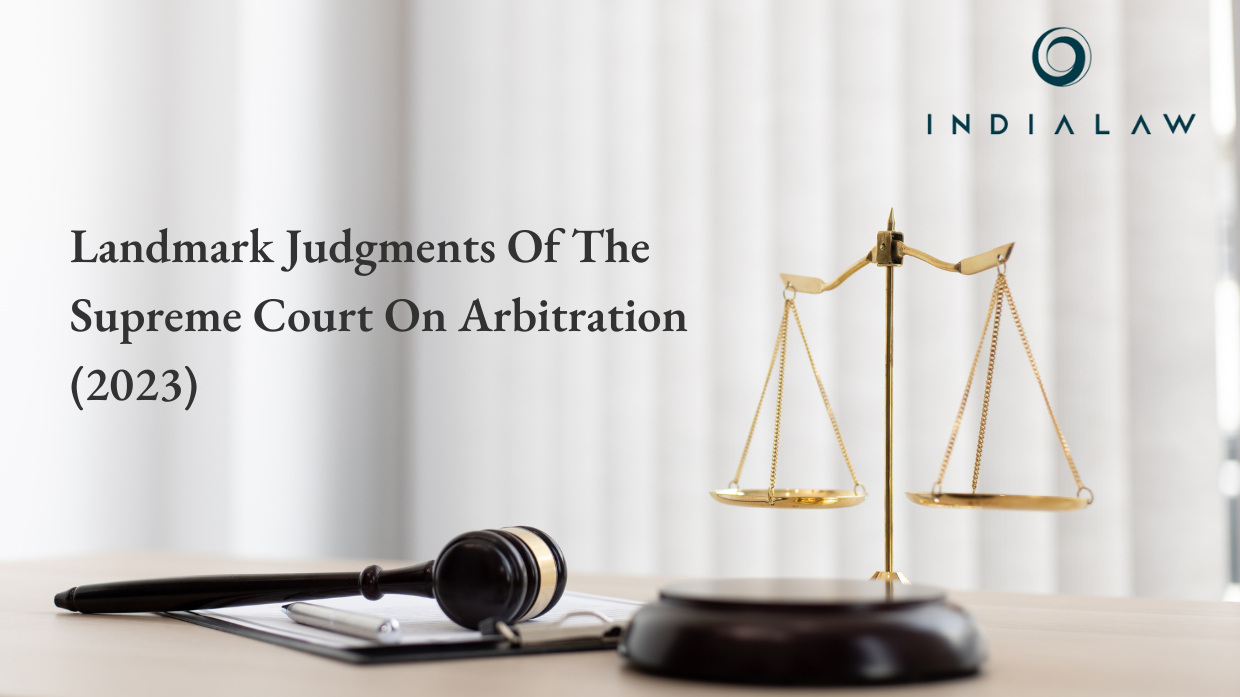Landmark Judgments Of The Supreme Court On Arbitration (2023)

Supreme Court Delivers a nuanced interpretation of amended Section 29A of the Arbitration Act
In January 2023, the Supreme Court (“SC”) in TATA Sons (P) Ltd. v. Siva Industries & Holdings Ltd. & Ors. [1], interpreted Section 29A of the Arbitration and Conciliation Act, 1996 (“Act”) in the context of international commercial arbitrations.
Facts in brief
In the year 2006, the Applicant, the Respondent No. 1 and Tata Teleservices Ltd. (“TTSL”) entered into a share subscription agreement (“the SSA”) for issuance and allotment of shares of TTSL to the Respondent No. 1. Subsequently, through another SSA, NTT Docomo Inc. (“Docomo”), acquired 26% equity shareholding of TTSL through a combination of primary and secondary shares. Thereafter, in the year 2009, by a secondary share purchase agreement (“SSPA”), Docomo acquired 20.740 million shares of TTSL from Respondent No. 1.
To this effect, an inter-se agreement, recording the understanding arrived at between the parties in the SSA and SSPA was executed. This inter-se agreement also provided for purchase of shares by Respondent No.1 in the event of sale of equity shares by Docomo. Pursuant to the said right, Docomo decided to sell off the equity shareholding.
When disputes arose between the Applicant and Docomo, the latter invoked arbitration against the former under the rules of the London Council of International Arbitration. In the said arbitration proceeding, the award was passed against the Applicant requiring them to make payment to Docomo and acquire shares put by it. As agreed, upon between the parties inter-se, the Respondent No. 1 and 2 were called upon to abide by the terms of agreement. Upon the Respondents failure to do so, arbitration as provided for in the inter se agreement was invoked.
The parties in the preliminary meeting agreed for an extension of the arbitrator’s mandate for 6 months. However, due to series of events that transpired in the interregnum, the Applicant made an interim application for an automatic extension of mandate owing to the amendment in Section 29A of the Act.
Analysis of the SC
The SC examined that to ensure flexibility in completing proceedings in cross-border disputes, the amended Section 29A of the Act explicitly states, “in matters other than international commercial arbitration”, whichspecificallyprecludes international commercial arbitrations from the mandatory timeline for rendering the arbitral awards. Further, the SC clarified that the 2019 amendment to the Act applies to all pending arbitral proceedings as of the effective date.
Supreme Court Clarifies that application referring disputes to arbitration cannot be entertained if cause of action is beyond the scope of arbitration agreement
In May 2023, the SC in Gujarat Composite Limited v. A Infrastructure Limited & Ors.[2] upheld the Gujarat High Court’s (“HC”) decision rejecting a commercial civil suit filed under Section 8 of the Arbitration and Conciliation Act, 1996 (Arbitration Act). In harmony with the HC judgment, the SC held that the relief claimed was beyond the ambit of the arbitration clause contained in the executed agreement. The issue raised under the suit comprised of multiple transactions, involving different parties and agreements that contained no arbitration clause barring one agreement.
Facts in brief
Gujarat Composite Ltd. (“the Appellant”) had entered into two license agreements with ‘A Infrastructure Limited,’ (“the Respondent No. 1”). The Appellant and Respondent No. 1 executed a supplementary agreement under which a certain amount was paid to the Appellant and Respondent No. 1 created a mortgage on the licensed manufacturing units to secure the ad hoc advance.
Subsequently, a tripartite agreement was executed between the Appellant, Respondent No. 1, and Bank of Baroda (Bank/ Respondent 2), wherein the bank sanctioned a loan to Respondent No. 1. The tripartite agreement was amended to restrict the transfer of title deeds of the Appellant’s land during the license agreement term.
Respondent No. 1 sought to extend the license agreement term, but the Appellant refused. After the license agreement expired, Respondent No. 1 continued to hold possession of the premises and the Appellant sought the possession. In view of the aforesaid, disputes arose between the parties.
Several attempts were made to amicably resolve the dispute, failing which, the Appellant filed a composite arbitration petition. To refer the said dispute for arbitration, the Respondent No. 1 filed a civil suit in the commercial court which was rejected as there was neither an arbitration clause in the tripartite agreement nor reference to the original agreement containing the arbitration clause.
Aggrieved by the commercial court order, the Appellant approached the HC. The HC, while rejecting the appeal, held that the suit was partly beyond the arbitrator’s jurisdiction, involving non-signatories to the arbitration agreement. Hence, Section 8 of the Act would not be attracted. Challenging the order of the HC, the Appellant filed an appeal before the SC.
SC’s decision
In consonance of the decision of the civil court and the HC, the SC while dismissing the appeal held that the words used ‘in a matter which is the subject of an arbitration agreement’ under Section 8 of the Act makes it abundantly clear that the subject matter of the dispute should be amenable to an arbitration agreement. The SC’s decision clarified that the court cannot refer the parties under Section 8 of the Act when a suit is instituted where the subject matter and the relief claimed by a party falls outside of the rubic of the arbitration agreement.
Supreme Court Clarifies that evidence is indispensable while Awarding Compensation for Loss of Profit and Overheads
In September 2023, the SC in Batliboi Environmental Engineers Ltd. v. Hindustan Petroleum Corpn. Ltd.[3] while dismissing the appeal and upholding the decision of the Bombay High Court (HC) applied more watertight criteria to determine the quantum of damages for loss of profit.
Facts in brief
On accepting the tender, the Respondent had awarded the turnkey contract to the Appellant for carrying out certain civil works. The Appellant sought 2 extensions, which were granted by the Respondent. However, after completing 80% of the work, the Appellant abandoned the Project. The Appellant claimed damages for breach of contract from the Respondent. Subsequently, the Appellant invoked arbitration. The arbitrator allowed the Appellant’s claim being ‘Compensation for loss of Overhead and profit and also profitability’.
Aggrieved by the award, the Respondent preferred an arbitration petition challenging the award before the Bombay High Court, which was dismissed by the Ld. Single Judge. Thereafter, HPCL, to challenge the dismissal, filed an appeal before the Division Bench. The Division Bench set aside the award.
Thereafter, an appeal by way of a Special Leave Petition (SLP) was filed before the SC against the decision of the Division Bench of the HC.
SC’s decision
The SC while upholding the HC Division Bench’s decision ruled that the award has been rightly held to be unsustainable by the HC.
The SC stressed that the impugned Arbitral Award is deficient as it is silent on the method of computation of damages. The SC revisited the scope of the Court’s power to review the awards under Section 34 of the Act and criticized the arbitral award for callous computation of claims, emphasizing careful reasoning and fairness.
The SC highlighted the following aspects while determining the claims for loss of profit and overheads:
- The contractor must prove his claims to seek compensation for loss of income affecting business turnover, and overheads workforce expenses that could have been deployed in other contracts;
- The drop-down of turnover due to the delay needs to be proved through books of accounts;
- In failure by the claimant to reflect loss of turnover due to the delay, it would be considered as a delay in receipt of money, for which interest on the capital employed be awarded;
- To ascertain the loss of overheads and profits formulas of Hudson’s, Emden’s, or Eichleay’s be applied considering the facts of each case and as a last resort.
Supreme Court Holds ‘Group of Companies Doctrine’ Can Also Bind Non-Signatories to Arbitration Agreement
In December 2023, constitution bench of the SC in Cox and Kings Ltd v. SAP India Pvt Ltd. & Anr.[4] held that an arbitration agreement may bind non-signatories through “group of companies” doctrine (“Doctrine”). The SC highlighted that the principle of “alter ego” or “piercing the corporate veil” cannot form the basis to trigger the doctrine.
Facts in brief
In the year 2010, the Petitioner and Respondent No. 2 entered an SAP Software End User License Agreement (‘License Agreement’). Respondent No. 2 was the proprietor and licensor of the software. SAP India Private Ltd. (Respondent No. 1) was its licensee in India, and it was a subsidiary of Respondent 2.
The License Agreement recorded that the said software was owned by Respondent No. 2, and Respondent No. 1 was only a licensee. Hence, there was an interlink between Respondent Nos. 1 and 2 while providing services to the Petitioner.
SC’s 3-Judges Bench
The SC noted that the doctrine had been applied several times in the Chloro Controls (Supra) decision and it should be applied with due caution. It added that merely because a non-signatory party is a member of affiliated companies, the agreement would not bind it. The SC doubting the ratio in Chloro Controls (Supra) about the doctrine, referred it to the Constitution Bench.
The Constitution Bench dealt with the issues: of whether the doctrine exists in Indian jurisprudence; whether can it be read in consonance with Section 8 of the Arbitration Act and whether it can bind a non-signatory party to agreement based on its implied consent.
SC’s Constitution Bench Decision
The SC concluded that an agreement will also bind non-signatories if there exists a legal relationship between the signatory and non-signatory parties with an intent to be bound, coupled with commercial involvement in the subject matter.
The doctrine must also be ascertained through the non-signatory’s intent to be a party in an agreement based on various factors including its direct relationship with the signatory parties, negotiation, performance, commonality of subject matter, composite nature of the transaction, etc. The non-signatory’s participation in all such activities would amount to its implied consent to be bound by the agreement.
Supreme Court Clarifies Arbitration Clause in Unstamped or Insufficiently Stamped Agreements Are Enforcement but Inadmissible as Evidence
In December 2023, the SC, In Re Interplay between Arbitration Agreements under the Arbitration and Conciliation Act, 1996, And the Indian Stamp Act, 1899[5] held that agreements containing arbitration clauses are enforceable even if unstamped or insufficiently stamped. It added that the defect is curable, not rendering an agreement void ab initio or unenforceable, but it is inadmissible as evidence.
The SC 7-judges bench comprising CJI DY Chandrachud, Justices Sanjay Kishan Kaul, Sanjiv Khanna, B R Gavai, Surya Kant, JB Pardiwala, and Manoj Misra, overruled the 5-judges bench decision in M/s. N.N. Global Mercantile Pvt. Ltd. v. M/s. Indo Unique Flame Ltd. And Ors.[6] which held that unstamped arbitration agreements are invalid and therefore not enforceable in law.
Petition’s evolution
In 2011 and subsequently, in 2020 [N N Global Case[7]], the SC held that unstamped arbitration agreements are unenforceable in law. Consequently, in 2021, the SC’s 3-judges bench disagreed with the previous rulings and referred the issue to the 5-judges Constitution Bench.
The Constitution bench relied on SMS Tea Estates Private Limited v. Chandmari Tea Company Private Limited[8] and ruled with a 3:2 majority that unstamped agreements are void and unenforceable. Concluding that the arbitration clause is inseparable from the principal contract, hence an arbitration clause contained in an unstamped principal contract would also be invalid.
Given the aforesaid enigmatic position, a curative petition was filed before the SC challenging the judgment passed in Bhaskar Raju and Brothers and Anr v. Dharmaratnakara Rai Bahadur Arcot Narainswamy Mudaliar Chattram & Other Charities and Ors.[9] The bench reconsidered the matter due to its “larger ramifications and consequences”.
The petitioner argued that the arbitration agreement’s existence and its validity were two different concepts. Based on this, it was contended that Section 11’s scope is to examine the agreement’s existence and not to ascertain its validity. It was contended that according to the ‘principle of kompetenz-kompetenz’ enshrined under Section 16 of the Act, the arbitrator must decide the validity of an agreement based on insufficient stamping.
The respondents contended that the decision in N N Global 2 (supra) was correct and in consonance with SMS Tea Estates (supra) which ought not to be disturbed.
Observations of the SC
The SC discussed the essence of the difference between the admissibility and voidness of an agreement by relying upon Section 2(g) of the Indian Contract Act, 1872 which states that an agreement not enforceable by law is void. Similarly, an agreement may be valid in law but inadmissible as evidence. When stating that an agreement is void, the same will be unenforceable in law but when it is unstamped or not duly stamped it cannot be considered as void ab initio.
The SC highlighted that Section 35 of the Indian Stamp Act (“Stamp Act”) states that no instrument chargeable with duty shall be admitted in evidence and not declared void ab initio. Further, Section 42(2) of the Stamp Act says that an instrument, for which stamp duty is duly paid and endorsed will be deemed “admissible in evidence”.
SC’s decision
The SC clarified that non-payment or inadequate payment of stamp duty shall not render the instrument invalid, though it shall be inadmissible in law. It ruled that the Stamp Act does not provide that unstamped or insufficiently stamped documents are void. As per the Stamp Act, it is a curable defect, which may be rectified as per the procedure provided thereunder.
[1] 2023 (SC) 39
[2] CIVIL APPEAL NO.3260 OF 2023
[3] 2023 SCC OnLine SC 1208
[4] Arbitration Petition (Civil) No. 38 of 2020
[5] 2023 LiveLaw (SC) 1049
[6] CIVIL APPEAL NO(S). 3802-3803 OF 2020
[7] WP No. 1801/2020 28-10-2020
[8] CIVIL APPEAL NO. 5820 OF 2011
[9] 2020 SCC OnLine SC 183
By entering the email address you agree to our Privacy Policy.



